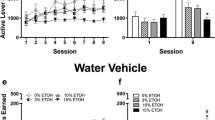Abstract
Rats were trained to lick at a drinking tube containing 5% ethanol to obtain access to a 0.1-ml dipper containing 20% sucrose. Following 20 of these drinking sessions, a lever press response was shaped and maintained with ethanol presentation in the dipper. This induction procedure resulted in rats responding on a FR 8 schedule of reinforcement to receive 40% (v/v) ethanol. Ethanol intakes over 0.5 g/kg in 30 min were obtained when ethanol concentrations over 10% were available. These intakes frequently resulted in blood ethanol levels over 100 mg ethanol/dl blood. This contingent sucrose induction procedure did not use food deprivation at any time. It is suggested that this procedure can be used to investigate the processes involved with the initiation of ethanol as a reinforcer independent of food restriction procedures.
Similar content being viewed by others
References
Ando K, Yanagita T (1981) Cigarette smoking in rhesus monkeys. Psychopharmacology 72:117–127
Beardsley PM, Lemaire GA, Meisch RA (1978) Ethanol-reinforced behavior of rats with concurrent access to food and water. Psychopharmacology 59:7–11
Black EL, Martin GL (1972) Extinction of alcohol drinking in rats following acquisition on a fixed-ratio schedule of reinforcement. Psychon Sci 29:152–154
Brink NG, Bonnichsen R, Theorell H (1954) A modified method for the enzymatic microdetermination of ethanol. Acta Pharmacol Toxicol 10:223–226
Coulson GE, Koffer KB, Coulson V (1971) Reinforcement of ethanol consumption in rats by an increase in the frequency of food-pellet delivery. Psychon Sci 23:103–104
Freed EX, Lester D (1970) Schedule-induced consumption of ethanol: Calories or chemotherapy. Psychiol Behav 5:555–560
Grant KA (1984) An experimental analysis of oral ethanol selfadministration in the free-feeding rat. Doctoral Dissertation, Univ Washington, Seattle
Grupp LA (1981) An investigation of intravenous ethanol selfadministration in rats using a fixed ratio schedule of reinforcement. Physiol Psych 9:359–363
Harris RT, Claghorn JL, Schoolar JC (1968) Self-administration of minor tranquilizers as a function of conditioning. Psychopharmacology 13:81–88
Henningfield JE, Meisch RA (1975) Ethanol-reinforced responding and intake as a function of volume per reinforcement. Pharmacol Biochem Behav 3:437–441
Keehn JD (1969) “voluntary” consumption of alcohol by rats. Q J Stud Alcohol 30:320–329
Martin GE, Myers RD (1972) Ethanol ingestion in the rat induced by rewarding brain stimulation. Physiol Behav 8:1115–1160
Meisch RA (1977) Ethanol self-administration: Infrahuman studies. In: Thompson T, Dews PB (eds) Advances in behavioral pharmacology, vol 1. Academic Press, New York, pp 35–82
Meisch RA, Henningfield JE (1977) Drinking of ethanol by rhesus monkeys: Experimental strategies for establishing ethanol as a reinforcer. In: Gross M (ed) Alcohol intoxication and withdrawal, vol 3. Plenum, New York, pp 443–463
Meisch RA, Thompson T (1971) Ethanol intake in the absence of concurrent food reinforcement. Psychopharmacology 22:72–79
Meisch RA, Thompson T (1972) Ethanol intake during schedule-induced polydipsia. Physiol Behav 8:471–475
Meisch RA, Thompson T (1973) Ethanol as a reinforcer: Effects of fixed-ratio size and food deprivation. Psychopharmacology 28:171–183
Meisch RA, Thompson T (1974) Ethanol intake as a function of concentration during food deprivation and satiation. Pharmacol Biochem Behav 2:589–596
Mello NK, Mendelson JH (1965) Operant drinking of alcohol on a rate contingent ratio schedule of reinforcement. Psychol Res 3:145–152
Myers RD, Veale WL (1972) The determinants of alcohol preference in animals. In: Kissin B, Begleiter H (eds) The biology of alcoholism, vol 2. Plenum, New York, pp 131–168
Persensky JJ, Senter RJ, Jones RB (1968) Induced alcohol consumption through positive reinforcement. Psychon Sci 11:109–110
Pickens R, Thompson T, Muchow DC (1973) Canabis and phencyclidine self-administration in animals. In: Goldberg L, Hoffmeister F (eds) Psychic dependence: Definition, assessment in animals and man, theoretical and clinical implications. Springer, New York, pp 78–86
Ramsay RW, van Dis H (1967) The role of punishment in the aetiology and continuance of alcohol drinking in rats. Behav Res Ther 5:229–235
Richter CP, Campbell KH (1940) Alcohol taste thesholds and concentrations of solutions preferred by rats. Science 91:507–508
Roehrs TA, Samson HH (1981) Ethanol-reinforced behavior assessed with a concurrent schedule. Pharmacol Biochem Behav 15:539–544
Roehrs TA, Samson HH (1982) Relative responding on concurrent schedules: Indexing ethanol's reinforcing efficacy. Pharmacol Biochem Behav 16:393–396
Samson HH, Falk JL (1974) Alteration of fluid preference in ethanol dependent animals. J Pharmacol Exp Ther 190:365–376
Samson HH, Roehrs TA, Tolliver GA (1982) Ethanol-reinforced responding in the rat: A concurrent analysis using sucrose as the alternative choice. Pharmacol Biochem Behav 17:333–339
Senter RJ, Persensky JJ (1968) Effects of environment on ethanol consumption in rats after conditioning. Q J Stud Alcohol 29:856–862
Senter RJ, Smith FW, Lewin S (1967) Ethanol ingestion as an operant response. Psychon Sci 8:291–292
Sinden JD, LeMaguen J (1982) Parameters of low-dose ethanol intravenous self-administration in the rat. Pharmacol Biochem Behav 16:181–183
Smith SG, Davis WM (1974) Intravenous alcohol self-administration in the rat. Pharmacol Res Comm 6:394–402
Smith SG, Werner TE, Davis WM (1976) Comparison between intravenous and intragastric alcohol self-administration. Physiol Behav 44:91–93
Author information
Authors and Affiliations
Rights and permissions
About this article
Cite this article
Grant, K.A., Samson, H.H. Induction and maintenance of ethanol self-administration without food deprivation in the rat. Psychopharmacology 86, 475–479 (1985). https://doi.org/10.1007/BF00427912
Received:
Accepted:
Issue Date:
DOI: https://doi.org/10.1007/BF00427912




